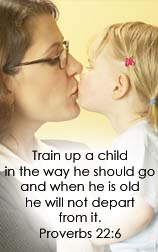Discipline
- In the Bible in Proverbs13:24 it says, “He who spares the rod hates his son, but he who loves him is careful to discipline him.”
- We often interpret this verse as spanking, but in reality, the rod was a tool used by shepherds in Biblical times to direct the sheep in the way they should go. It was not a tool for punishment.
- Discipline is a word that has two meaning. One of the meanings is punishment and the other is to teach. The ideal discipline program for a child is one that teaches what behaviors are acceptable and what behaviors are not acceptable.
- Helps children learn to control their behavior so that they act according to their ideas of right and wrong, not because they fear punishment.
- For example…they are honest because they think it is wrong to be dishonest, not because they are afraid to get caught.
- This is our goal for our children…they don’t start out here.
- We have to be the ones who teach them right and wrong, and hold them accountable until they develop their own sense of right and wrong.
- Our job as a parent is to work ourselves out of a job.
- Preschool children are busy learning about the world around them
- They ask lots of questions
- They love to imitate adults
- They are learning to share and take turns
- They like to try new things and often take risks
- They may try to shock you at times by using “forbidden” words
- Getting attention is fun for a preschooler, being ignored is not
- Preschoolers like to make decisions for themselves
- They have lots of energy
- The psychological stage of a preschooler is autonomy vs. shame and doubt. They are figuring out that they are their own little selves and that they can say NO and MINE!
- They can get carried away by their “power” and get bossy.
- There is no one right way to discipline
- But there are things we can do to assure that our children grow up learning the difference between right and wrong!
- Set a good example!
- Preschoolers love to imitate adults!
- Watch your habits because your kids will be sure to copy them!
- If you want them to treat each other kindly, you have to demonstrate it
- Good eating habits, how much you watch TV, the language you use will all be caught rather than taught!
- Praising children encourages learning, independence, and strong self-esteem in children.
- Say things like, “You did a great job putting your clothes away,” or “This painting has beautiful colors!”
- Watch your language and focus on what to do rather than what not to do!
- Try saying:
- Slow down and walk instead of Stop running
- Come hold my hand instead of Don’t touch anything
- Keep your feet on the floor instead of Don’t climb on the couch
- Use your quiet voice inside instead of Stop screaming and shouting
- Sometimes when a child is doing something that you don’t want them to do you can distract them with something else or redirect them to something else.
- Try to ignore the behavior if the child isn't doing something that is harmful (or if it isn't something that you directly told them not to do).
- Withhold all attention and praise or support.
- This works when the child is trying to get attention by screaming or saying bad words.
- Sometimes you can tell the child that you can go into the other room and scream if you would like to, but not here.


























No comments:
Post a Comment